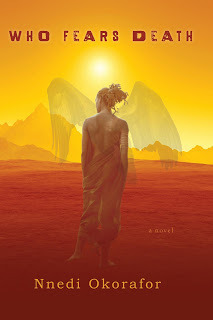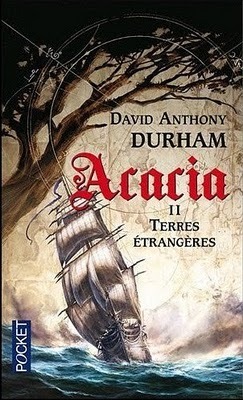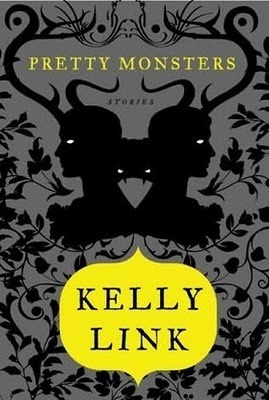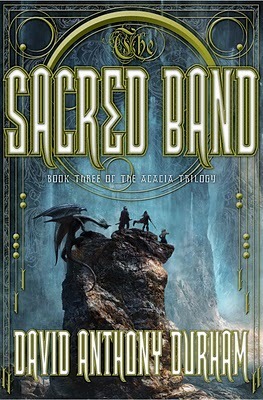David Anthony Durham's Blog, page 39
February 23, 2011
Nebula Nominees!
 Science Fiction and Fantasy Writers of America (SFWA) has just announced the nominees for the 2010 Nebula Awards!
Science Fiction and Fantasy Writers of America (SFWA) has just announced the nominees for the 2010 Nebula Awards!There are plenty of categories, but I always turn my eyes first to the Novel category. This year, I see some very worthy titles on the list, including a few by some friends. I'll play no favorites here, though. I'll just state the facts (and provide randomly selected cover art).
The Novel Finalists are:
The Native Star, M.K. Hobson (Spectra)
 The Hundred Thousand Kingdoms (The Inheritance Trilogy), N.K. Jemisin (Orbit UK; Orbit US)
The Hundred Thousand Kingdoms (The Inheritance Trilogy), N.K. Jemisin (Orbit UK; Orbit US)Shades of Milk and Honey, Mary Robinette Kowal (Tor)
Who Fears Death, Nnedi Okorafor (DAW)
Blackout and All Clear, Connie Willis (Spectra)
The complete list is available HERE, at the SFWA website.
Published on February 23, 2011 20:36
February 18, 2011
Care For Another Cover?
Well, I hope so, cause I can't help but share it. Herewith, my first glimpse at the Pocket version (mass market paperback) of the French The Other Lands - "Terres étrangères":



Published on February 18, 2011 04:59
February 16, 2011
I Am Love
So, this blog was never supposed to just be about my novels or about things fantastic, but I realize I haven't been posting as much random stuff, like movie recommendations and such that are far outside of the genre. I should correct that. Not everything I read or view fits into one category, and I imagine the same is true for you.
 With that in mind, I'll want to mention a movie I saw the other day and quite liked. It's on dvd, an Italian movie called Io Sono L'Amore (I Am Love). It stars
With that in mind, I'll want to mention a movie I saw the other day and quite liked. It's on dvd, an Italian movie called Io Sono L'Amore (I Am Love). It stars
Of course, some folks get paid to explain such things. The reviewer from Time Out had this to say:
'I Am Love' is a brazen blueprint for a cinema that straddles past and future while worrying little about trends of the present. It's a bold experiment rooted in tradition. It plays like smart opera and looks like a marriage of poetic documentary with classical European drama.
Does that send you running for the hills? Perhaps. Well, try Roger Ebert's review, then. I think he does a fine job of making sense of it in his review of the film, which you can read HERE. Take a look, and it if it sounds like your thing give it a try.

 With that in mind, I'll want to mention a movie I saw the other day and quite liked. It's on dvd, an Italian movie called Io Sono L'Amore (I Am Love). It stars
With that in mind, I'll want to mention a movie I saw the other day and quite liked. It's on dvd, an Italian movie called Io Sono L'Amore (I Am Love). It stars Of course, some folks get paid to explain such things. The reviewer from Time Out had this to say:
'I Am Love' is a brazen blueprint for a cinema that straddles past and future while worrying little about trends of the present. It's a bold experiment rooted in tradition. It plays like smart opera and looks like a marriage of poetic documentary with classical European drama.
Does that send you running for the hills? Perhaps. Well, try Roger Ebert's review, then. I think he does a fine job of making sense of it in his review of the film, which you can read HERE. Take a look, and it if it sounds like your thing give it a try.
Published on February 16, 2011 07:05
February 14, 2011
Boskone
 So it's conference time again!
So it's conference time again!This time I'll just be heading down the road a little bit to Boston, for Boskone. I attended for the first time last year, and enjoyed it quite a bit. Should be fun this time around too. I've got a rather choice lineup of events/appearances, with lots of interesting folks in the mix.
One of the things I like about my panels this time around is that they all look to be... well... fun. They look like fun. Positive. Sort of hanging out and talking about books and authors we like. No deep and meaningful conversations for me. Hopefully nothing contentious. Just a good time. You should come along!
HERE'S the Website for general information.
And here's what I'll be doing:
Friday 6pm
Big Canvas, Little Strokes: Creating an Epic Fantasy Series
Peter V. Brett
David Anthony Durham (M)
Elaine Isaak
Rosemary Kirstein
Jo Walton
Building a world in fractal detail, animating a vast cast of characters, finding and holding an audience: let's talk about the challenges of writing in a format with perhaps the broadest scope in the business.
(It seems like I'll be attached at the hip to Peter V. Brett this weekend. We have three events events together!)
 Friday 9pm
Friday 9pm Against a Bright Background -- Building a Vivid World
Karen Anderson (M)
David Anthony Durham
Elaine Isaak
Robert Kuhn
Karl Schroeder
It's a main strength (or weakness) of much SF and fantasy. How is it done when it's done well? Let's talk about the nuts and bolts of worldbuilding: physical setting, flora, fauna, nonhuman (ET or otherworldy) beings, cultures, languages, economies, cuisines, and more!
Saturday 10am
Autographing
Saturday 11am
New Faces of Science Fiction/Fantasy/Horror
Laird Barron
Peter V. Brett
Paul Di Filippo (M)
David Anthony Durham
Kelly Link
These exceptional writers may still be in the early stages of their
career, but already we catch glimpses of greatness. Let's name names
-- and talk about what makes them so special.
(And can I just say, "Hurrah, I'm on a panel with Kelly Link! Fun.)
 Saturday 1pm
Saturday 1pm Kaffeeklatsch
Peter V. Brett
David Anthony Durham
(The True Blood imagery is, of course, in honor of Charlaine Harris, with whom I'll be sharing the stage for:)
Saturday 2pm
Authors I Love (And Why)
Paul Di Filippo
David Anthony Durham (M)
Charlaine Harris
James D. Macdonald
Sunday 10am
Reading: David Anthony Durham
If you're anywhere near the Boston area, consider dropping in. It really is a good time!
Published on February 14, 2011 09:01
February 12, 2011
Acacia: Die Fernen Lande
 Just want to acknowledge that The Other Lands debuts today in Germany! I'm very pleased about this. I absolutely love the way that Blanvalet has presented my books, and I really appreciate the faith they have in them.
Just want to acknowledge that The Other Lands debuts today in Germany! I'm very pleased about this. I absolutely love the way that Blanvalet has presented my books, and I really appreciate the faith they have in them.Of course, I hope to hear that they're signing on for The Sacred Band, but it's early days for that.
Today, I'm just happy to be aboard this boat...
It's available HERE, at Amazon.de if your German is up to it!
Published on February 12, 2011 07:13
February 9, 2011
A Sacred Cover
This is very, very preliminary. I just got the jpeg for this moments ago, so by no means is this guaranteed to be the finished product, but...
I offer Doubleday's preliminary take on a cover for The Sacred Band:

Thoughts?
I offer Doubleday's preliminary take on a cover for The Sacred Band:

Thoughts?
Published on February 09, 2011 12:56
February 8, 2011
Top Fantasy Destinations for the Adventurous Traveler
Hannah Strom-Martin and Erin Underwood have posted a humorous travel guide to places fantastic over at UNDERWORDS. Take a look. You may notice some places you've been, or places you want to go!
Check it out: HERE.
Check it out: HERE.
Published on February 08, 2011 12:29
February 6, 2011
Publish Small?
Publishing is a good thing. Really, it is.
But I have felt myself wondering about what feels like a new variation on an old question lately. Namely, I'm seeing more and more folks - in many cases students I've been in contact with in various programs - publish works in online magazines that that I've never heard of, and that I'm not sure have much of a readership or hope for a lasting reputation. Now, the fact that I haven't heard of a site doesn't mean a thing. It could just mean that I'm lame, uncool, out of it. May be a great site, no doubt, with just the sort of readers the writers are looking for. I'm absolutely sure that's the case sometimes. But I'm just as sure that it's not the case other times.
I know some established authors that advise aspiring writers to write, revise, submit. Publish and move on to the next thing. I generally agree, but I also think that to that mantra one should add caveats, like 1) submit selectively after doing your homework about what publications might like your work and introduce you to the readers you really want to have, 2) know that you might need to return for a second or third or fourth round of revision to a story, even if you've also moved forward with other ones, and 3) remember that publishing isn't the end of the game - it's the start of it, and you'll want to make sure that start is a strong one.
Please understand that I'm not talking about established sites/magazines with a core readership. There are lots of ways that publications with modest readerships are great places to be published. I'm talking about sites that have newly appeared and are hoping to find a readership - and looking to use your words to do it. I've heard students lament having "published" a story with a site that promptly vanished - taking the story and the rights to republish it with them into the netherworld. I've also seen some sites that seem to need content so desperately that quality is secondary. And I've heard people admit that they published something on a site that they personally had no interest in reading. Hmmm. Come on folks - if you don't like a publication enough to read other stories published in it, why would you want to put your own work in it?
This all got me wondering if the plethora of places to publish is a good thing, or if it's actually something of a pitfall that's not ultimately going to benefit the writer. I have an opinion on this.
Before I get to it, though, I'd ask you to consider this post by Ann Leckie and the comments that follow it. I read this a while back, and it speaks directly to what I'm talking about. She lays some of the fundamental issues out and talks with a lot of clarity about them. And, as you'll note from the fact that her discussion jumped off a John Scalzi-sponsored discussion about another related topic, this question has real significance in our changing publishing landscape. So go take a look and then come back.
Okay, you're back? Very glad. So what do you think?
My short thoughts are that emerging writers should be mindful of where they publish, at least in terms of what their expectations are. I can see lots of reasons to enjoy engagement with an online community that's far from the mainstream and that's hitting an audience - however small - of like-minded readers (most of whom are probably aspiring writers themselves). That said, I also believe aspiring writers should be very careful where they publish for two reasons - one artistic and one career-oriented.
Artistically... Sorry say it, but being rejected and having to face what that means is a very important part of developing as a writer. It's got to happen. It should happen. Through the process of offering fiction and being turned down we grow more and more into who we are as writers. I'm not suggesting that every editor knows what's best or anything like that. That's not the point. I believe that writers should face rejection no matter how brilliant they are. It's working and facing obstacles that pushes us to get better, to linger longer with our characters and themes, to grow a bit older, to find more effective ways to communicate. Or to decide that you've done it just right, and just need to find the right person to agree. Or… to face the fact that not every story needs to find a publisher; sometimes they should stay unpublished; that's not always a bad thing.
I've listened to the news of publication success for some stories in the last few years with mixed emotions. On one hand, I'm happy if the writer is happy. On the other hand, I've also felt, "Oh, that's a shame. That story would've been really good after another revision." Instead of being locked in to a marginal publication, it might have found a home someplace that got it noticed by people with the capacity to move a career forward.
Oh, and that's where the career side of things kicks in. I agree completely with Ann's assessment that a history of small publications doesn't mean much to the people that remain in charge of publishing mainstream books. If you don't care about those folks, fine. If your objective isn't publication for the widest audience possible that's fine too. There are lots of ways to enjoy your life as a writer. Small venues can be just the sort of thing to keep you going - and keep you happy. But if what you're after is your own personal world domination… then I suggest that you be as careful with where you submit your work as you are with how you craft it.
But I have felt myself wondering about what feels like a new variation on an old question lately. Namely, I'm seeing more and more folks - in many cases students I've been in contact with in various programs - publish works in online magazines that that I've never heard of, and that I'm not sure have much of a readership or hope for a lasting reputation. Now, the fact that I haven't heard of a site doesn't mean a thing. It could just mean that I'm lame, uncool, out of it. May be a great site, no doubt, with just the sort of readers the writers are looking for. I'm absolutely sure that's the case sometimes. But I'm just as sure that it's not the case other times.
I know some established authors that advise aspiring writers to write, revise, submit. Publish and move on to the next thing. I generally agree, but I also think that to that mantra one should add caveats, like 1) submit selectively after doing your homework about what publications might like your work and introduce you to the readers you really want to have, 2) know that you might need to return for a second or third or fourth round of revision to a story, even if you've also moved forward with other ones, and 3) remember that publishing isn't the end of the game - it's the start of it, and you'll want to make sure that start is a strong one.
Please understand that I'm not talking about established sites/magazines with a core readership. There are lots of ways that publications with modest readerships are great places to be published. I'm talking about sites that have newly appeared and are hoping to find a readership - and looking to use your words to do it. I've heard students lament having "published" a story with a site that promptly vanished - taking the story and the rights to republish it with them into the netherworld. I've also seen some sites that seem to need content so desperately that quality is secondary. And I've heard people admit that they published something on a site that they personally had no interest in reading. Hmmm. Come on folks - if you don't like a publication enough to read other stories published in it, why would you want to put your own work in it?
This all got me wondering if the plethora of places to publish is a good thing, or if it's actually something of a pitfall that's not ultimately going to benefit the writer. I have an opinion on this.
Before I get to it, though, I'd ask you to consider this post by Ann Leckie and the comments that follow it. I read this a while back, and it speaks directly to what I'm talking about. She lays some of the fundamental issues out and talks with a lot of clarity about them. And, as you'll note from the fact that her discussion jumped off a John Scalzi-sponsored discussion about another related topic, this question has real significance in our changing publishing landscape. So go take a look and then come back.
Okay, you're back? Very glad. So what do you think?
My short thoughts are that emerging writers should be mindful of where they publish, at least in terms of what their expectations are. I can see lots of reasons to enjoy engagement with an online community that's far from the mainstream and that's hitting an audience - however small - of like-minded readers (most of whom are probably aspiring writers themselves). That said, I also believe aspiring writers should be very careful where they publish for two reasons - one artistic and one career-oriented.
Artistically... Sorry say it, but being rejected and having to face what that means is a very important part of developing as a writer. It's got to happen. It should happen. Through the process of offering fiction and being turned down we grow more and more into who we are as writers. I'm not suggesting that every editor knows what's best or anything like that. That's not the point. I believe that writers should face rejection no matter how brilliant they are. It's working and facing obstacles that pushes us to get better, to linger longer with our characters and themes, to grow a bit older, to find more effective ways to communicate. Or to decide that you've done it just right, and just need to find the right person to agree. Or… to face the fact that not every story needs to find a publisher; sometimes they should stay unpublished; that's not always a bad thing.
I've listened to the news of publication success for some stories in the last few years with mixed emotions. On one hand, I'm happy if the writer is happy. On the other hand, I've also felt, "Oh, that's a shame. That story would've been really good after another revision." Instead of being locked in to a marginal publication, it might have found a home someplace that got it noticed by people with the capacity to move a career forward.
Oh, and that's where the career side of things kicks in. I agree completely with Ann's assessment that a history of small publications doesn't mean much to the people that remain in charge of publishing mainstream books. If you don't care about those folks, fine. If your objective isn't publication for the widest audience possible that's fine too. There are lots of ways to enjoy your life as a writer. Small venues can be just the sort of thing to keep you going - and keep you happy. But if what you're after is your own personal world domination… then I suggest that you be as careful with where you submit your work as you are with how you craft it.
Published on February 06, 2011 13:58
February 2, 2011
E Bear On Care And Feeding
One of my illustrious fellow Clarion instructors, Elizabeth Bear, has posted a wee piece on the Clarion blog. She writes that she wasn't sure what to post about for awhile, until she hit on an idea:
 "...it occurred to me that I could do two for the price of one. Which is to say, I could talk about maintaining the physical plant, and the importance of telling detail all at once."
"...it occurred to me that I could do two for the price of one. Which is to say, I could talk about maintaining the physical plant, and the importance of telling detail all at once."
Wanna know what that's about? Take a look HERE.
Just so you know, I'll be blogging on something or other at the same spot later this month. I'll mention it when it's live, of course.
And... I would be remiss if I didn't prod you would be speculative fiction writers to apply to the program. It's intense, longish, and not cheap, BUT... man, it works. Any MFA program out there that had the alumni list that the Clarion residency has would be considered among the top programs in the country. Good place to write and to meet other people that are going to be voices in the genre in the future!
Head HERE to get more information on applying.
 "...it occurred to me that I could do two for the price of one. Which is to say, I could talk about maintaining the physical plant, and the importance of telling detail all at once."
"...it occurred to me that I could do two for the price of one. Which is to say, I could talk about maintaining the physical plant, and the importance of telling detail all at once."Wanna know what that's about? Take a look HERE.
Just so you know, I'll be blogging on something or other at the same spot later this month. I'll mention it when it's live, of course.
And... I would be remiss if I didn't prod you would be speculative fiction writers to apply to the program. It's intense, longish, and not cheap, BUT... man, it works. Any MFA program out there that had the alumni list that the Clarion residency has would be considered among the top programs in the country. Good place to write and to meet other people that are going to be voices in the genre in the future!
Head HERE to get more information on applying.
Published on February 02, 2011 07:46
January 31, 2011
The Sacred Amazon
It's happened. That landmark moment in any book's life these days. The Sacred Band is up on Amazon! I'm not sure when it appeared, but it looks like some kind folks have already bought a copy or two. Thank you. Much appreciated. There's more where those came from!
Although... well, you should remember that the pub date is officially October 4th. So, it's not really a purchase at this point. It's more a good faith indication that a purchase will happen nine months from now. Still, I'm pleased.
Now, if I could just get those editorial comments back from my editor I could make sure there will be a finished book to published that day...
Although... well, you should remember that the pub date is officially October 4th. So, it's not really a purchase at this point. It's more a good faith indication that a purchase will happen nine months from now. Still, I'm pleased.
Now, if I could just get those editorial comments back from my editor I could make sure there will be a finished book to published that day...
Published on January 31, 2011 11:49



